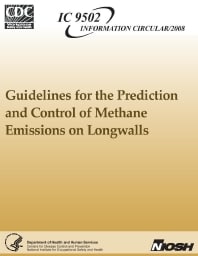Mining Product: Guidelines for the Prediction and Control of Methane Emissions on Longwalls
Original creation date: March 2008
Authors: SJ Schatzel, C� Karacan, RB Krog, GS Esterhuizen, GV Goodman
NIOSHTIC2 Number: 20033422
Pittsburgh, PA: U.S. Department of Health and Human Services, Public Health Service, Centers for Disease Control and Prevention, National Institute for Occupational Safety and Health, DHHS (NIOSH) Publication No. 2008-114, Information Circular 9502, 2008 Mar; :1-83
Although longwall mining productivity can far exceed that of room-and-pillar mining, the total methane emissions per extracted volume associated with longwall sections are generally higher than those for continuous miner or pillar removal sections. Increased face advance rates, increased productivities, increased panel sizes, and more extensive gate road developments have challenged existing designs for controlling methane on longwalls. Methane control research by the National Institute for Occupational Safety and Health (NIOSH) recently examined a number of practices designed to maintain concentrations in mine air within statutory limits and consistently below the lower explosive limit. In this report, several practical guidelines are recommended for controlling longwall coalbed methane. All predictions are based on determinations made for the Pittsburgh Coalbed in southwestern Pennsylvania.

NIOSHTIC2 Number: 20033422
Pittsburgh, PA: U.S. Department of Health and Human Services, Public Health Service, Centers for Disease Control and Prevention, National Institute for Occupational Safety and Health, DHHS (NIOSH) Publication No. 2008-114, Information Circular 9502, 2008 Mar; :1-83